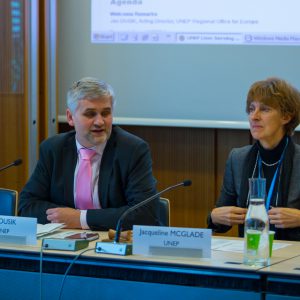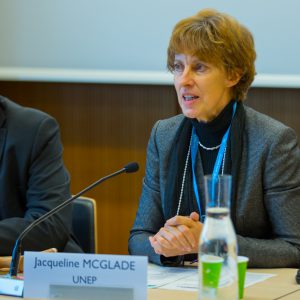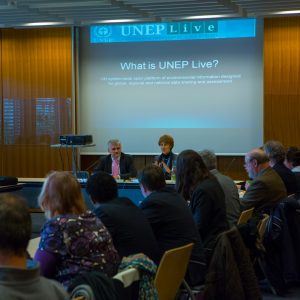Événement
UNEP Live | Serving the World Community by keeping the Environment Under Review

15 Jan 2014
13:00–14:00
Organisation: Geneva Environment Network
The Geneva Environment Network Secretariat organized an information session on UNEP Live, by Jacquline McGlade, which took place at the International Environment House, on Wednesday 15 January.
UNEP provides capacity building amongst its member countries and assessments for actionable policies at national, regional and global levels. Its work covers a wide range of themes including mitigation and adaptation policies for climate change, managing ecosystem services, improving chemicals & waste management and many others, and including the post-2015 Sustainable Development Goals. Given the growing demand for detailed, contextualised knowledge about the environment, UNEP must now develop richer sets of data and knowledge flows and communities of networks. UNEP Live aims to support this need.
Agenda
Welcome Remarks
Jan DUSIK, Acting Director, UNEP Regional Office for Europe
Presentation of UNEP Live
Jacqueline MCGLADE, Senior Advisor to UNEP Executive Director
Light sandwiches and fairtrade coffee from 12:45
UNEP Live – www.uneplive.org
UNEP Live is both a conceptual framework and a technology platform to organize and manage knowledge and capacity-building activities for environmental assessment, monitoring and reporting. It seeks to harness the potential of technologies such as web, mobile devices, and social media among others, to change the way in which environmental assessment, monitoring and reporting are done.
UNEP Live, a web-based platform, will:
- facilitate the exchange and sharing of up-to-date data, information, assessments and knowledge amongst member countries, research networks, communities of practice, indigenous peoples and society, in order to keep the environment and emerging issues under review.
- provide access to national and regional information (MyCountry, MyRegion) and global data sets
- provide a range of big-data, visualisation, mapping and publishing tools) via local and cloud services
UNEP Live will provide a system-wide data-knowledge service, a consistent approach to community networking and knowledge synthesis, an Information Communications Technology governance strategy and a comprehensive data policy for external and internal use. It will achieve this by:
i) encouraging and supporting greater community networking;
ii) embracing new developments in information and communication technologies;
iii) implementing a governance strategy regarding privacy, user accountability, propensity and auditing and a data policy that reflects the general principles of streamlining, sharing and access; and
iv) involving staff and experts from across UNEP, the MEAs and other UN organisations and national institutions, plus regional and global environmental change programmes and assessments.
Jacqueline McGlade
Jacqueline McGlade is the Senior Advisor to the Executive Director of the United Nations Environment Programme, where she has special responsibilities for UNEP-Live and Eye on Earth.
From 2003 to 2013, Prof McGlade was the Executive Director of the European Environment Agency (EEA). She presided over a significant increase in the coverage and extent of data and information processed and analysed by the EEA and a doubling of resources for the agency. During this time, membership reached 32 countries and the EEA participated in activities in more than 60 countries globally.
A strong advocate of new technologies to improve information gathering, including crowdsourcing, and providing citizen access to environmental information, Prof McGlade was also instrumental in establishing the Shared Environmental Information System (SEIS) in the European Union. SEIS brings together key aspects of national and international research for environmental planning, monitoring and reporting, including information from the EU’s Copernicus Earth observation programme.
Discussion
Following questions and remarks by Canada, France, UNEP colleagues, IISD, Zoï and others, Jacqueline provided additional information on the cooperation with other UN agencies, communication to countries on the tool, geography and collaborative science, topics covered, protection of IDs, validation of data, expand of information, crowdsourcing, the role of NGOs in facilitating the collection of data.
More information and documents
UNEP Live will officially go live on 16 January at www.uneplive.org and www.unep.org/uneplive
https://www.genevaenvironmentnetwork.org/wp-content/uploads/2020/05/uneplive_geneva_january_2014.pdf





